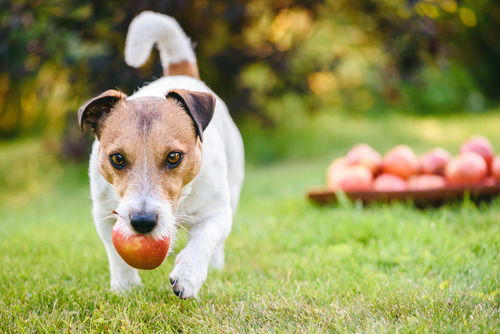Many pet owners love sharing snacks with their dogs, but not every food made for humans is safe for pets. A common question veterinarians may hear is, “Can dogs eat fruit?” Since fruit is a staple in many households, knowing what’s safe and what should be avoided helps you protect your dog’s health. This blog dives into which fruits dogs can enjoy, which ones pose risks, and how to introduce fruit into their diet responsibly.
Why Pet Owners Ask: Can Dogs Eat Fruit?
Dogs are naturally curious eaters. Whether they sneak a bite from the kitchen counter or beg when you grab an apple, their interest often sparks the question: can dogs eat fruit? Fruit offers natural sweetness, hydration, and certain nutrients, but not all varieties are safe. Some fruits provide vitamins and fiber, while others can be harmful or even toxic.
When asking the question, can dogs eat fruit, it’s important to remember that dogs have different digestive systems than humans. While people benefit from a wide variety of fruits, dogs process some sugars, acids, and seeds differently. A fruit that’s healthy for you might upset your dog’s stomach or worse. That’s why knowing safe versus unsafe fruits makes a big difference.
Safe Fruits for Dogs
Some fruits can be a healthy treat when offered in moderation. The next time you ask, “Can dogs eat fruit?”, consider these safe options:
Apples
Apples are a popular dog-safe fruit. They provide fiber and vitamin C while remaining low in fat. Always remove the seeds and core before feeding, since apple seeds contain compounds that aren’t safe for pets. Small slices or cubes make excellent training rewards.
Blueberries
Blueberries pack antioxidants and are safe in small portions. These bite-sized fruits are easy to feed and don’t require preparation beyond a quick rinse. For pet owners asking, “Can dogs eat fruit?” blueberries support a dog’s immune system and make a great snack choice.
Bananas
Bananas are high in potassium and fiber. Many dogs enjoy their soft texture and natural sweetness. However, because bananas contain sugar, they should be an occasional snack, not a daily staple.
Watermelon
Watermelon is safe for dogs and provides hydration during warmer months. Remove seeds and rind before serving. A cool piece of watermelon can be refreshing for dogs on hot Colorado days.
Strawberries
Strawberries contain fiber and vitamin C. They are safe in moderation but, like bananas, they carry natural sugars. Slicing them into small pieces makes them easy for dogs to eat safely.
Fruits Dogs Should Avoid
When asking, “Can dogs eat fruit?”, it’s equally important to know which ones to avoid. Some fruits can cause digestive upset or contain toxic compounds.
Grapes and Raisins
Even small amounts of grapes or raisins can be toxic to dogs. They have been linked to kidney damage, and veterinarians strongly advise avoiding them completely.
Cherries
Cherries contain pits that pose a choking hazard and can cause intestinal blockages. The pits, stems, and leaves also contain substances that are toxic to dogs.
Citrus Fruits
Oranges, lemons, and limes contain citric acid that may cause stomach upset. While small amounts of peeled orange might not be harmful, it’s best to avoid citrus fruits altogether.
Avocado
Avocados contain a compound called persin, which can be harmful in large amounts. The pit also presents a serious choking and blockage risk.
Stone Fruits (Peaches, Plums)
Peaches and plums have pits that can cause harm. While the flesh itself might not be toxic, the risks outweigh the benefits. Dogs may choke or suffer from intestinal blockages if they swallow a pit.
How to Safely Introduce Fruit to Your Dog
Knowing the answer to whether dogs can eat fruit goes beyond which varieties are safe. It also involves how you introduce them. Dogs may react differently to new foods, so slow and careful introduction is best. Here are some tips:
- Start Small: Offer a small piece to see how your dog reacts. Some dogs have sensitive stomachs and may not tolerate fruit well, even if it’s generally safe.
- Watch for Reactions: After your dog eats a new fruit, monitor for signs of digestive upset. This could include loose stool, gas, or reduced appetite.
- Prepare Properly: Always wash fruit thoroughly and remove seeds, pits, and rinds. Cut fruit into small, manageable pieces to prevent choking.
- Offer in Moderation: Even safe fruits should not make up a large portion of your dog’s diet. Think of them as occasional treats rather than daily meals.
Commonly Asked Questions About Dogs and Fruit
Pet owners often bring up similar concerns when asking can dogs eat fruit.
Can Dogs Eat Fruit Every Day?
Dogs should not eat fruit daily in large amounts. While safe fruits can be beneficial, too much sugar and fiber may cause digestive issues. Occasional fruit treats are safer.
Can Puppies Eat Fruit?
Puppies have developing digestive systems, so fruit should be introduced carefully and sparingly. Always consult your veterinarian before offering new foods to young dogs.
Can Dogs Eat Dried Fruit?
Dried fruits, such as raisins or dried apricots, often contain concentrated sugars and may include additives. It’s best to avoid dried fruit entirely.
Local Veterinary Support in Boulder, CO
If you’re still asking can dogs eat fruit and want tailored advice for your pet, our veterinary team at Boulder Veterinary Hospital is glad to help. Every dog is different, and what works for one may not work for another. By speaking with your veterinarian, you can get guidance that considers your dog’s age, health history, and nutritional needs. Boulder Veterinary Hospital proudly serves pets and families in Boulder, CO. Call (303) 442-6262 to schedule an appointment or book online for professional guidance on your dog’s nutrition and overall care.





